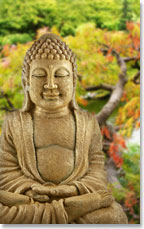 Buddha spoke highly of fasting and said that during his fasts, “My soul becomes brighter, my spirit, more alive in wisdom and truth.” Buddha’s fasting experience played a central role in formation of Buddhism. Around 500 B.C.E., Siddhartha Gautama (Buddha) left his affluent family in search of enlightenment.
Buddha spoke highly of fasting and said that during his fasts, “My soul becomes brighter, my spirit, more alive in wisdom and truth.” Buddha’s fasting experience played a central role in formation of Buddhism. Around 500 B.C.E., Siddhartha Gautama (Buddha) left his affluent family in search of enlightenment.
Siddhartha believed that desire was the root of mortality and that if he led an ascetic life he could end desire and gain liberation from suffering. After prolonged fasting in an attempt to achieve enlightenment, he concluded that he had attained nothing and decided to end his fast. He ate, regained his strength, renewed his meditation, and realized Buddhahood. Only after he stopped fasting did he realize his mahabodhi, or great awakening.
Buddha’s story of fasting demonstrates how spiritual awakenings during the process of asceticism. His experience illustrates how physiological and spiritual changes affect the mind and how the process before, during, and after the event causes enlightenment. In some respects, it explains how the mind, body, and spirit are synergistically transformed during the act of asceticism. Many acts of asceticism, such as fasting, cause intense self-examination. It is not uncommon for thoughts and emotions to ebb, flow and explode from the deepest part of self.
Once the ascetic act is over, a spiritual awakening can occur as the mind, body, and spirit move back into a more even state of consciousness, subsequently causing a shift in the participant’s view of self in relation to reality. In this manner, ascetic experiences cause spiritual awakenings, visions, and peak experiences that vary in perceived degree of intensity.
Acts of asceticism can cause a breaking and rejoining of the mind, body, and spirit. When this occurs on a parallel plane the magnitude of the dismemberment can be extraordinary. As the self is deconstructed, rearranged, and reconstructed, it can cause momentary anxiety and confusion, sometimes followed by crystal clear clarity. This may explain why some historians believe that Buddha’s ascetic fasting experience was the spiritual vehicle for his enlightenment. By removing his attachment for food – the most fundamental need we have – Buddha extracted from his life the major obstruction to his self-actualization.